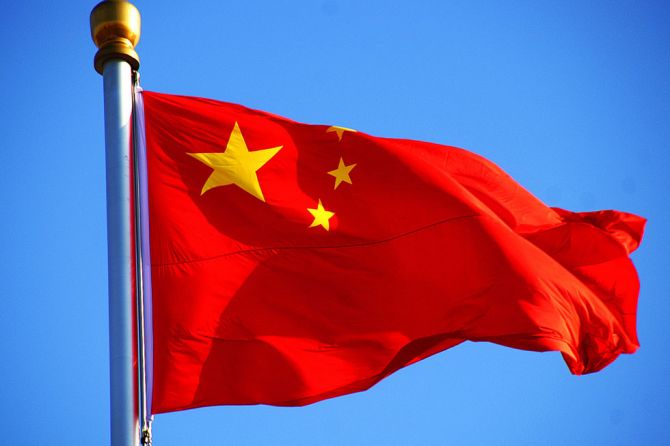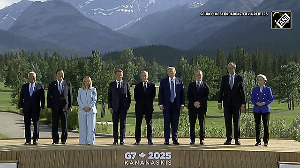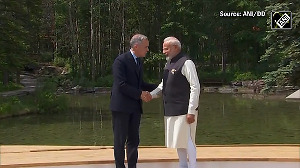 While China is bigger and feels mightier at the moment, Beijing’s rulers would be well advised not to be tempted to provoke India, for that would only trigger a chain reaction around the world that would not serve anyone’s interests, says Sanjaya Baru.
While China is bigger and feels mightier at the moment, Beijing’s rulers would be well advised not to be tempted to provoke India, for that would only trigger a chain reaction around the world that would not serve anyone’s interests, says Sanjaya Baru.
Sitting in the central court of the Imperial Palace in Beijing’s Forbidden City any ruler would imagine his is the world’s ‘Middle Kingdom’, but never underestimate the impact that the Kremlin has on its occupants. The sheer grandeur and opulence of the Tsar’s Palace also has the effect of making its inhabitants imagine they rule the world. Or, at least, that the world must come pay its respects at their gates and in those chandeliered halls.
As India’s Prime Minister Manmohan Singh walks his way through these two grand capitals, his mind would remain at home. But, he could pick up an idea or two from his host in Moscow on how to project one’s nation globally, even when the home front is not all that comfortable.
Ever since the Soviet Empire imploded Moscow’s rulers have tried hard to regain their global stature. Thanks to the political and fiscal impasse in Washington DC and America’s unsure ways in Asia and Europe, Russia has been able to return once again to the global high table.
Despite the power-prosperity imbalance between Russia and the United States, Putin has showed how Russia’s geo-political clout can make up for its geo-economic weakness. If US mistakes in the Middle East helped Putin raise Russia’s global profile, China’s missteps and hubris in the east and south-east Asia, once called Indochina, have opened up new spaces for India’s profile to be raised in the east.
One important difference between the India-Russia and the India-China relationship, however, is that while there is more happening between India and China than between India and Russia, there is greater trust between Russia and India than between the two Asian neighbours. This lack of trust has been complicated by a new wave of hubris in Beijing.
Participating in a China-India-United States trilateral discussion at a leading think tank in Beijing a young scholar had a question that many around the world increasingly ask. “Today US is number one power and China is number two power,” said the young man, “by 2025 China will be number one power and US will be number two power. A dialogue between us is necessary to manage the transition.” He then wondered aloud, “But why is India here? What is India’s rank? Where will it be in 2025?”
There is no use telling today’s young Chinese that for centuries, and till not long ago, the gap between China and India was never so wide as for anyone to view these Asian neighbours as unequal. Linear projections that show China becoming the world’s biggest economy by 2025 also show India becoming the third biggest. But linear projections are statistical short-cuts and history takes its twists and turns.
While China has for centuries been ahead of India in terms of income and manufacturing capability, in the last two decades this gap has sharply widened in terms of economic performance, military capability and global influence.
Even so, an Indian political leader who would have no problem complaining to a domestic audience about being bullied by a developed western power, even earning public sympathy for it, would only be inviting derision and mockery if she were to make similar complaints about China. Ordinary people understand that the rich and powerful bully the poor and meek. But, no Indian political leader can still afford to so complain about China since China is still viewed by the general Indian public as more of an equal than a mightier unequal.
Therein lies the challenge for India’s political leadership in managing the transition phase in the medium term when China would remain more powerful but cannot be treated as such. To be sure, China is nowhere as powerful as the United States but it has acquired the ability to impose its will on individual nations around the world.
From Australia to Germany, from South Africa to South Korea, political leaders are careful not to rub China on the wrong side. When the odd one like Japan’s Prime Minister Shinzo Abe tries to, the Chinese make their displeasure known to all, and western media lectures Abe to be careful. Indeed, even US President Barack Obama had to postpone a meeting with the Dalai Lama at one point so as not to upset Beijing, and when the British tried to be brave about it, they were shown their place.
Given this context, Dr Singh has so far been measured in the management of relations with China. He has been firm when firmness was required and accommodative when accommodation was possible. When the Chinese protested the Dalai Lama’s visit to Arunachal Pradesh, Dr Singh let it be known that no one can dictate to India who can travel where within India. After the Depsang incursion, while some of Singh’s advisors advocated a cautious response the PM let it be known that Chinese Prime Minister Li Keqiang’s visit would be in jeopardy if Chinese troops did not retreat to their earlier positions.
More to the point, during the past decade India has taken steps to strengthen its defence and surveillance capability along the entire Himalayas. One of Dr Singh’s important initiatives in the north-east was to build the trans-Arunachal highway and bolster border posts. On the other hand, Dr Singh has been extremely correct and cordial in his dealings with China and has never shied away from recognising China’s emerging regional and global role.
Over the years Dr Singh has devoted considerable time to understand China, carefully poring over internal PMO files dating back to the 1950s, reading books and taking tutorials from the likes of Lee Kuan Yew and top class China scholars at home and abroad.
To be sure, Dr Singh goes to Beijing at a time when many around the world have come to doubt the India story. The very same Lee Kuan Yew who once used the metaphor of the two engines of an aircraft to describe the role of China and India in Asia, today believes India is no longer in the same league as China. In 2007, Lee wrote an essay in Forbes magazine wondering why the world is worried about China’s rise but is more comfortable with India’s and wondered if India’s openness, pluralism and democracy were the secrets to its global appeal. The same Lee now dismisses all talk of India being a balancer to China in Asia.
More than the slowing down of the Indian economy over the three years, it is the disfunctionality of the Indian system and its navel gazing politics that has raised new questions about India’s ability to play the role of a balancer in Asia’s emerging power politics. Can Dr Singh get Moscow and China to take India more seriously? That will be his single biggest challenge during this trip.
India will, of course, have to continue to focus on its domestic agenda of economic growth and development and maintain good relations with all major powers. In pursuing these priorities India can work with China, being more open to Chinese investment and increased business-to-business links. Over time both China and India can resolve their border dispute, while making sure that incidents like Depsang do not happen again.
While China is bigger and feels mightier at the moment, Beijing’s rulers would be well advised not to be tempted to provoke India, for that would only trigger a chain reaction around the world that would not serve anyone’s interests. Neither China nor India can afford to play zero-sum games and both would be better off learning to cooperate while competing, avoiding conflict even while contending with the trust deficit.
Sanjaya Baru is director for geo-economics and strategy, International Institute for Strategic Studies and honorary senior fellow, Centre for Policy Research, New Delhi.


.jpg)








